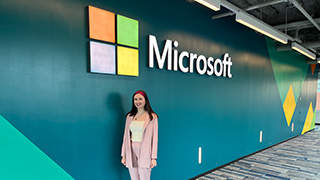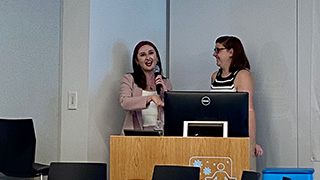New Faculty Member Presents at Microsoft Conference About Generative AI
Monday, December 4, 2023
 On October 23, Jess Rauchberg, Ph.D., a new faculty member in the College of Human Development, Culture, and Media, presented at "The Promises and Perils of Generative AI in the Creator Economy,"
an event hosted by Microsoft Research New England. As one of over thirty participants
from around the world, Rauchberg "was invited to co-facilitate with a Microsoft colleague
a demonstration that showed the availability of generative AI tools that digital creators,
such as a social media influencer, might use in their work." However, the event was
more than just presentations, it also put-on workshops and hosted a roundtable featuring
industry experts discussing the future of AI and its place in politics and business.
On October 23, Jess Rauchberg, Ph.D., a new faculty member in the College of Human Development, Culture, and Media, presented at "The Promises and Perils of Generative AI in the Creator Economy,"
an event hosted by Microsoft Research New England. As one of over thirty participants
from around the world, Rauchberg "was invited to co-facilitate with a Microsoft colleague
a demonstration that showed the availability of generative AI tools that digital creators,
such as a social media influencer, might use in their work." However, the event was
more than just presentations, it also put-on workshops and hosted a roundtable featuring
industry experts discussing the future of AI and its place in politics and business.
For those who are experts in the field, generative AI is an easy concept to understand and discuss; what about the average person? In simpler terms, Rauchberg who serves as an assistant professor in the College’s Department of Communication, Media, and the Arts, describes generative AI as "a form of artificial intelligence trained to generate content — text, image, sound or video." Some popular examples of generative AI are Chat GPT, which is a chat bot developed by open AI, and "Canva's Magic Media tool, which uses textual input to generate visual content, such as an infographic or a short-form vlog." Unsurprisingly, both platforms are becoming increasingly popular tools, particularly on college campuses.
 To help research this topic, Rauchberg worked with a colleague at Microsoft, Zoë Glatt,
Ph.D. When asked how she felt about the research partnership, Rauchberg stated that
she "appreciated the opportunity to collaborate with Glatt," and felt it helped connect
generative AI to her research and teaching methods. As a researcher who focuses on
Ableism, generative AI helps her interrogate ideological bias in computational systems
and creator economies.
To help research this topic, Rauchberg worked with a colleague at Microsoft, Zoë Glatt,
Ph.D. When asked how she felt about the research partnership, Rauchberg stated that
she "appreciated the opportunity to collaborate with Glatt," and felt it helped connect
generative AI to her research and teaching methods. As a researcher who focuses on
Ableism, generative AI helps her interrogate ideological bias in computational systems
and creator economies.
"In upcoming research, I aim to investigate the impact of generative AI technologies on exacerbating existing biases that shape whose labor is visible and valued in digital platform spaces," said Rauchberg.
She also noted that Glatt was not just an aid in this project, but a notable partner. Glatt, a postdoctoral research fellow in Microsoft Research New England's Social Media Collective, shared many of the same research interests as Rauchberg, which only help further develop their idea for the presentation. Beginning from a point of relative unfamiliarity about the topic, Rauchberg and Glatt were able to build off their own strengths and interrogate the relationships between generative AI and "forms of creative labor, such as lifestyle influencing, and how the interplay between work, culture, and technology inform existing structures of bias, justice, and identity."
With new technological tools at her disposal, Rauchberg can take her research to new heights. "How will the proliferation of generative AI shape creative work for disabled creators?" she posed. "Will these tools reinforce ableist ideas about work, play, and information sharing, or can they orient us toward futures beyond technological bias?" Clearly generative AI fixes largely into her research, and her presentation provided her with an opportunity to interrogate its role further.
Seton Hall’s College of Human Development, Culture, and Media activates the synergies of communication, education, and media to equip the change makers of tomorrow with cutting-edge skills that drive social innovation. Through our interdisciplinary approach to learning, our graduate programs embrace today’s digital culture while training students to lead and solve pressing problems in their chosen field as well as society. Graduates are prepared to practice in a multi-media world — whether that be as a multi-media communicator, teacher, counselor, psychologist, school or law enforcement leader.
Visit here for more information on our Department of Communication, Media, and the Arts.
Categories: Science and Technology






